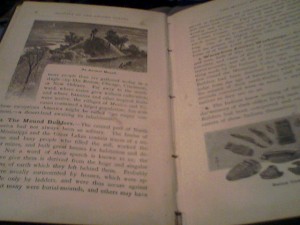I briefly got my mitts on a crumbling copy of an 1881 book entitled, The Eclectic History of the United States, which was written by Mary Elsie Thalheimer. (Sadly, there’s very little info online about her.) The book features brief entries about America from prehistoric times, beginning with an entry about the Mound Builders, all the way up to the technological developments of the late 19th-century. The Eclectic History is generally pretty enlightened and toward the end, the book examines the backlash that was then going on against Chinese immigrants, which wasn’t much different from today’s backlash against Mexican immigrants. An excerpt:
“[Chinese laborers] already number more than 100,000 in America, of whom 75,000 are in the state of California alone. They cross the Pacific often in large companies under the direction of contractors, and find employment in the mines, in factories, in market-gardening, and domestic service. On the other hand, fear has arisen lest the relations of the ‘coolies’ with the contractors may abridge the personal liberty which the Government wishes to guarantee every inhabitant of the country; on the other, lest the habits of heathenism, which the immigrants have brought with them, may prove injurious to the morals of the community. It can not be said, however, that the noisiest opponents of the Chinese are the most orderly or the most Christian part of the population, while the ‘heathen’ very often sets a worthy example of quiet industry and obedience to law.
In the early months of 1879 a bill passed both houses of Congress setting aside part of the Burlingame treaty, and putting a check on further immigration from China. President Hayes vetoed the bill. considering the faith of the United States, pledged to the fulfillment of the treaty until both governments could agree to change it. This was effected in September of the following year, when treaties were made between the two governments, giving the United States the right to limit or suspend the immigration of Chinese laborers.
What no one fears or regrets is the presence of one hundred and four Chinese youth in our academies and colleges. Since the opening of the great Asiatic empire to intercourse with other nations, boys of good birth and talents have been sent to be educated in the United States at the expense of their own government. Their superintendent here is Yung Wing, a Chinese mandarin, who is himself a graduate of Yale College, and lately minister of China in Washington. The government of Japan has sent not only boys to American colleges, but young women to fit themselves for teachers of girls at home.”


